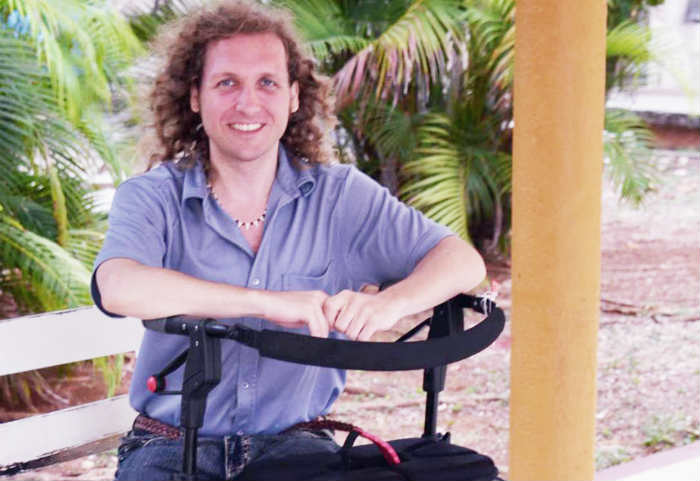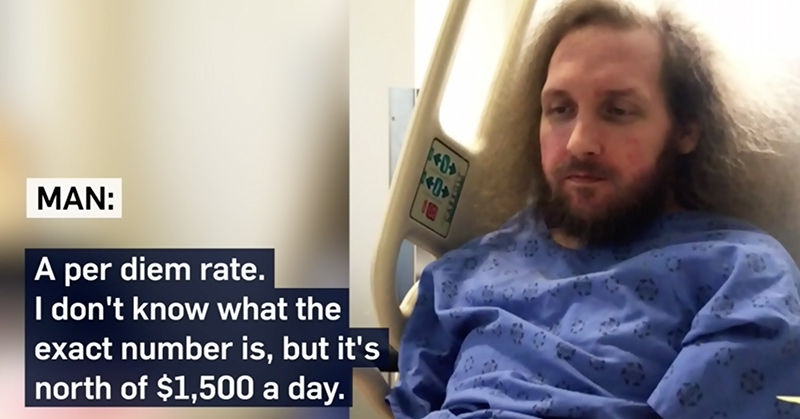This article was originally written in September 2018 and has since been updated.
Can you imagine having an incurable brain disorder that has left you bed-ridden, unable to feed yourself or speak properly, and limited your ability to move your arms and legs? How about being in that circumstance and only being given two options: (1) pay $1,800 a day to keep your hospital bed or (2) medically assisted death? This is exactly what terminally ill 42-year-old Roger Foley says he is facing right now in Ontario, Canada.
Foley suffers from an incurable brain disorder called cerebellar ataxia, which is caused by a dysfunctional cerebellum, the part of your brain involved in motor control, coordination, and sensory perception. Over the years, he has suffered from some of cerebellar ataxia’s most common side effects:[1]
- Floppiness
- Lack of coordination between muscles, joints, limbs, or organs
- Impaired ability to control speed, distance, and power of limb and eye movement
- Poor sense of time (i.e., being able to tell how much time has passed)
- Inability to perform rapid, alternating movements
The extent to which someone suffers from these problems varies but, in Foley’s case, he is growing more and more dependent on others to help him function properly and safely.
Roger Foley Wasn’t Always Plagued by Cerebellar Ataxia

Foley, who used to be a bank manager in London, Ontario, has had no choice but to accept his “grievous and irremediable” condition.
“I have gone from being an active person to on some days not even being able to get out of bed because of the neuropathy, chronic fatigue and inability to coordinate my limbs,” said Foley.[2] “Despite these physical challenges and deteriorations, I’ve managed to keep a positive attitude.”
But the care he has received has been questionable and problematic. That’s what led to Foley and his lawyer, Ken Berger, to file a lawsuit in Ontario Supreme Court on February 14, 2018. The lawsuit goes against several health agencies including a hospital in London citing “that a government-selected home care provider had previously left him in ill health with injuries and food poisoning. He claims that he has been denied the right to self-directed care, which allows certain patients to take a central role in planning and receiving personal and medical services from the comfort of their own homes.”[3]
As reported by National Post, home care workers have also administered the wrong medication, fallen asleep in his house, left burners lit on the stove (in one case, actually starting a fire), and injured him during transfers and exercises.[2]
Foley Releases Coercive Recordings
To date, Foley’s claims have yet to be tested in court. And now, he has come forward to CTV News with recordings from two separate occasions (one from September 2017 and the other from January 2018).
In the first recording, when Foley asked how much staying at the hospital would cost, the staff member said, “I don’t know what the exact number is, but it is north of $1,500 a day.”[3]
In response to Foley expressing his frustration about having his preferences violated, the worker said: “Roger, this is not my show. I told you my piece of this was to talk to you about if you had an interest in assisted dying.”[3]
It’s clear that in the second recording, Foley still feels like the hospital is trying to coerce him into ending his life. He has thought about ending his life, but clarified that it was due to how he has been treated during his hospital stay.
One worker is heard telling Foley again about assisted death: “Just apply to get an assisted, if you want to end your life, like you know what I mean?” The worker is quick to clarify: “I’m saying if you feel that way… You know what I mean? Don’t get me wrong. I’m saying I don’t want you to be in here and wanting to take your life.”[3]
Foley Released Recordings to Shed Light on a Bigger Issue

In a statement for CTV, Foley’s aim was to let the public know the truth about assisted deaths in Canada.
“I have not received the care that I need to relieve my suffering and have only been offered assisted dying. I have many severe disabilities and I am fully dependent. With the remaining time I have left, I want to live with dignity and live as independently as possible.”[3]
Foley believes there should be better and more safeguards and appropriate care for people who are suffering instead of assisted death being one of the first options they’re given.
Medical Assistance in Dying (MAID)
In Ontario, it is legal for someone to talk to their doctor or nurse practitioner about medical assistance in dying. However, there are some eligibility requirements. He or she must:[4]
- be eligible for publicly funded health care services in Canada
- be 18 years of age or older
- be capable of making health care decisions
- have a grievous and irremediable medical condition
In one sense, MAID could be a perfectly dignified option for some people. However, there are greater concerns, including the idea that assisted death may be abused in order to cut costs. Tom Koch, an ethicist, is well aware of that possibility:[3]
“The larger concern is when the issue of the care of the fragile becomes simply a matter of financial expediency. When we are given the option for a rapid death rather than a complex life then we are all at risk.”
The moment we are so quick to dismiss human life is the moment we need to question our values. Especially when it’s coming from the very institutions that are supposed to care for us.
Sources
- [1] Nordqvist, C. (2017, December 13). Ataxia: Types, symptoms, treatment, and causes. Retrieved from https://www.medicalnewstoday.com/articles/162368.php
- [2] Brean, J. (2018, March 17). Denied ‘assisted life,’ chronically-ill Ontario man is offered death instead: Lawsuit. Retrieved from https://nationalpost.com/news/canada/denied-assisted-life-by-hospital-ontario-man-is-offered-death-instead-lawsuit
- [3] Chronically ill man releases audio of hospital staff offering assisted death. (2018, August 03). Retrieved from https://www.ctvnews.ca/health/chronically-ill-man-releases-audio-of-hospital-staff-offering-assisted-death-1.4038841
- [4] Medical assistance in dying and end‑of‑life decisions. (n.d.). Retrieved from https://www.ontario.ca/page/medical-assistance-dying-and-end-life-decisions
- Image Source: https://nationalpost.com/news/canada/denied-assisted-life-by-hospital-ontario-man-is-offered-death-instead-lawsuit

